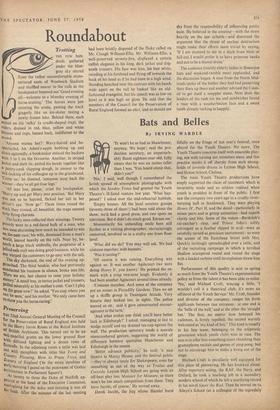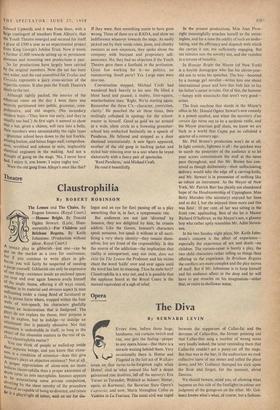Bats and Belles
By IRVING WARDLE
'IT won't be as bad as Manchester, anyway. We hope'; said the pro- duction secretary, an imperturb- ably fluent eighteen-year-old, fully aware that he was six inches taller than I was. 'You heard about that, didn't you?'
'No,' I said, well though I remembered the lavish spread of atmospheric photographs with which the Sunday Times had greeted the Youth Theatre's ill-fated venture last year. 'What hap- pened?' I asked over the mid-rehearsal hubbub.
`Empty houses. All the local amateur groups (seventy-three of them!) had been told about the show; we'd had a good press, and two spots on television. But it didn't do much good. Excuse me.'
Momentarily his unbending smile bent still further as a visiting photographer, excruciatingly contorted, involved us in a crafty one from floor level.
'What did we do? You may well ask. We had costume marches; with banners.'
Was it raining?'
'Of course it was raining. Everything was against us. It was another Agincourt (we were doing Henry V, you know).' He pointed the re- mark with a crisp two-note laugh. Evidently it had been another Agincourt several times already.
'Costume marches. And some of the company put on scenes in Piccadilly Gardens. Then we set up a skiftle group in Deansgate Arcade. Very bizarre they looked too, in tights. The police moved us on : said it gave unwarranted encour-. agement to the tarts.'
`And what makes you think you'll have better luck in Edinburgh?' I asked, managing at last to wedge myself and my drained tea-cup against the wall. The production secretary made a suavely unencumbered gesture, suggesting the world of difference between quotidian Manchester and Edinburgh in the season.
'Better, advance publicity,' he said; 'a nice theatre in Moray House; and the festival public —they're always ready for Shakespeare, even for something as out of the way as Troilus and Cressida. Leyton High School are going with an off-beat play too, Measure for Measure, so there won't be too much competition from them. They have Jacobi, of course.' He moved away.
Derek Jacobi, the boy whose Hamlet burst fitfully on the fringe of last year's festival, once played for the Youth Theatre. No more. The Youth Theatre concerns itself with ensemble play- ing, not with turning out miniature stars; and this practice marks it off sharply from such strong- holds of juvenile drama as Leyton High School, and Sloane School, Chelsea.
The main Youth Theatre productions have amply supported the claim of teamwork which is invariably made and so seldom realised when youth is prodded in front of the public. I first saw the company two years ago in a cruelly rever- berating hall in Southwark. They were playing Henry IV, Part II, and the detail—particularly in minor parts and in group animation—had superb clarity and bite. Some of the voices—Bardolph's rat-catcher's rasp, and Prince John's softly astringent as a feather dipped in acid—were as carefully turned as precision instruments : so were the scenes of the Eastcheap brawl with Mrs. Quickly invitingly spreadeagled over a table, and of the recruiting campaign in which a terrified Shallow scampered round and round the stage with a loaded carbine until its explosion threw him flat.
Performance of this quality is said to spring as much from the Youth Theatre's experimentalist policy as from the talent it has been able to enlist. `No,' said Michael Croft, wincing a little, 'I wouldn't call it a theatricar club; it's more an offshoot of the Youth Service.' Mr. Croft, founder and director of the company, ranges his fresh applicants between two extremes : at one end is the 'belle of the ball,' and at the other the 'straight bat.' The first, no matter how honeyed his cadences, is firmly repelled; the second warmly welcomed as 'my kind of boy.' This kind is usually in his late teens, belonging to the enigmatic generation which youth clubs woo in vain. The aim is to offer him something more absorbing than gramophone recitals and games of ping-pong; but not to encourage him to make a living out of the stage. • Michael Croft is peculiarly well equipped for this piece of pioneering. He has knocked about. After repertory acting, the RAF, the Navy, and Oxford, he took a teaching job in a secondary modern school of which he left a scarifying record in his novel Spare the Rod. Then he moved on to Alleyn's School (as a colleague of the legendai y Edward Upward), and it was from there, with a large contingent of members from Alleyn's, that the Youth Theatre emerged and secured for itself a grant of £500 a year as an experimental project, from King George's Jubilee Trust. Now it wants a further £1,000 towards setting up in permanent premises and mounting two productions a year.
So far productions have largely been carried by the original members. Now the net has been east wider, and the cast assembled for Troilus and Cressida represents a juicy cross-section of the tripartite system. It also puts the Youth Theatre's Ideals to the test.
Although tightly packed, the interior of the rehearsal room on the day I went there was severely partitioned into public, grammar, com- prehensive, and old stagers. (No secondary Modern boys—`They leave too early, and they're usually too bad.') At first sight it seemed to show that a bat, given a chance, will turn into a belle. New members were unmistakably the right types grammar school boys down to the last freckle, missing button, and bitten finger-nail; comprehen- sives, scrubbed and solemn in suits, implacably Chemical engineers in the making. And not a thought of going on the stage. 'No, I never have had. I enjoy it, you know; I enjoy rugby too.' Were the old gang from Alleyn's once like this? If they were, then something seems to have gone wrong. Three of them are at RADA, and show no indifference whatevffr towards the stage. As easily picked out by their suede coats, jeans, and chunky sweaters as new sixpences, they spoke about the company with buoyant and proprietary self- assurance. No, they had no objection if the Youth Theatre gave them a foothold in the profession. Great fun working for it—no politics, no manoeuvring. Small parts? Yes. Large ones were nice too.
Conversation stopped. Michael Croft had wandered back heavily to his seat. He lifted a blunt hand and paused; a stubby, four-square, weatherbeaten man. 'Right. We're starting again. Remember the three C's—character, conviction, clarity.' He punched the air three times, then smilingly collapsed in apology for the school- master in himself. Good as gold we sat around in a wide, silent circle as a frowning grammar- school boy embarked hesitantly on a speech of Pandarus. He faltered and stopped as a door slanimed ostentatiously. A new figure appeared, another of the old gang in hacking jacket and styled hair mincing over to a seat where he toyed elaborately with a fancy pair of spectacles.
'Read Pandarus,' said Michael Croft.
He read it beautifully.



































 Previous page
Previous page